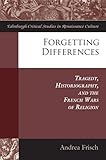Forgetting Differences : Tragedy, Historiography, and the French Wars of Religion / Andrea Frisch.
Material type: TextSeries: Edinburgh Critical Studies in Renaissance Culture : ECSRCPublisher: Edinburgh : Edinburgh University Press, [2022]Copyright date: ©2015Description: 1 online resource (192 p.)Content type:
TextSeries: Edinburgh Critical Studies in Renaissance Culture : ECSRCPublisher: Edinburgh : Edinburgh University Press, [2022]Copyright date: ©2015Description: 1 online resource (192 p.)Content type: - 9780748694396
- 9780748694402
- 842/.309 23
- DC111.3 .F75 2015
- online - DeGruyter
- Issued also in print.
| Item type | Current library | Call number | URL | Status | Notes | Barcode | |
|---|---|---|---|---|---|---|---|
 eBook
eBook
|
Biblioteca "Angelicum" Pont. Univ. S.Tommaso d'Aquino Nuvola online | online - DeGruyter (Browse shelf(Opens below)) | Online access | Not for loan (Accesso limitato) | Accesso per gli utenti autorizzati / Access for authorized users | (dgr)9780748694402 |
Frontmatter -- Contents -- Acknowledgements -- Series Editor's Preface -- 1 Learning to Forget -- 2 Clemency, Pardon, and Oubliance -- Chapter 3 History without Passion: National Historiography in the Age of Oubliance -- 4 Tragedy as History: From the Guisiade to Garnier -- 5 From Emotion to Affect -- Conclusion -- Index
restricted access online access with authorization star
http://purl.org/coar/access_right/c_16ec
Examines the impact of the royal politics of amnesia on tragedy and national historiography in France, 1560-1630By juxtaposing representations of the French civil war past as they appear (and frequently overlap) in historiography and tragedy from 1550-1630, Andrea Frisch tracks changes in the ways in which history and tragedy sought to 'move' readers throughout the period of the wars and in their wake. The book shows that a shift from a politically (and martially) active reading of the past to a primarily affective one follows the imperative, so clear and urgent at the turn of the seventeenth century, to put an end to violent conflict. The emotions that neoclassical tragedy and absolutist historiography sought to elicit were intended above all to be shared, and thus a medium via which political and religious differences could be downplayed or forgotten. The book aims to illuminate some of the ways in which the experience of the wars of religion, as registered in tragedy and historiography, contributed to a restructuring of the ever-vital relationship between emotion and politics, and thereby to historicize the very concept of 'esmouvoir'.Key FeaturesConfronts historiography and tragedy in the era of the French Wars of ReligionAddresses the themes of amnesty, pardon, memory, and forgetting in the context of civil warProvides both close readings and a broad argument about the impact of the monarchical politics of reconciliation on conceptions of how history and tragedy should 'move' their audiencesTreats multiple French authors including André de Nesmond; Henri-Lancelot Voisin de la Popelinière; Pierre Matthieu; Jean de la Taille; Robert Garnier
Issued also in print.
Mode of access: Internet via World Wide Web.
In English.
Description based on online resource; title from PDF title page (publisher's Web site, viewed 02. Mrz 2022)


